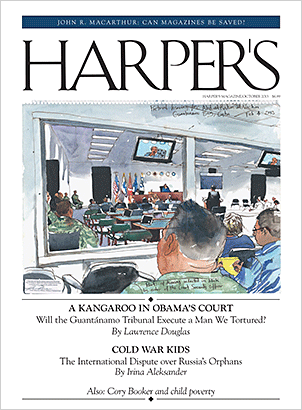Introducing the October 2013 Issue
The show trials at Guantánamo Bay, Bela Bartók’s monsters, the fate of Russia’s adopted children, and new fiction by T. C. Boyle
The October issue of Harper’s Magazine begins with a letter to readers from publisher John R. MacArthur, in which he outlines the principles he set out with at the magazine more than thirty years ago and his hopes for the future of magazine publishing. Our cover story concerns the prison at Guantánamo, which continues to shake my confidence in our country’s values. Despite President Obama’s promises, he has proven either reluctant or unable to close the camp, a fact that returned to the news this summer thanks to an extended hunger strike by dozens of prisoners. Less remarked upon was another Bush-era policy that Obama has maintained at Guantánamo: the use of military commissions to try terrorism suspects. Lawrence Douglas, who wrote about the trial of Nazi war criminal John Demjanjuk for our March 2012 issue, traveled to the base to report on the preliminary hearings of Abd al-Nashiri, the senior Al Qaeda lieutenant alleged to have masterminded the attack on the U.S.S. Cole in Yemen in 2000. Under Obama, Douglas writes, extensive efforts have been made to establish the legal legitimacy of the commissions through scrupulous attention to the rules of due process. But, the author asks, can there be such a thing as a fair trial for a man the United States has tortured so extensively that he can hardly function? Al-Nashiri may be guilty of serious crimes, but his trial is likely to be merely for show. The report is accompanied by drawings and paintings from Steve Mumford, who accompanied Douglas on several trips to Guantánamo.
In a long folio narrative that speaks to the best human instincts, Jay Kirk writes about the Hungarian composer Béla Bartók, who acted out his fantasies by traveling through Transylvania and recording the music of the Roma. Kirk retraces Bartók’s journey through a haunted landscape, a place little changed since the composer was there in the early days of the twentieth century with his Edison wax-cylinder recorder. Things go wrong almost from the start, and Kirk barely escapes with his life. The essay is a tour de force — an absurd, scary, drunken, funny, and finally heartfelt tribute to Bartók’s music, one that is sure to enthrall lovers of both modernist music and brilliant travel writing.
Readers might remember the young child who in 2010 was sent back to Russia carrying a stuffed animal because his American adoptive parents couldn’t handle him. The note pinned to his chest, which was addressed “To Whom It May Concern,” said: “This child is mentally unstable. . . . I am sorry to say that for the safety of my family, friends, and myself I no longer wish to parent this child. . . . As he is a Russian National, I am returning him to your guardianship.” With the relationship between Russia and the United States continuing to deteriorate—over Syria, Edward Snowden, missile defense, and gay rights — Irina Aleksander has written a timely report on one of the most controversial measures enacted by Russia’s leaders in the past year: a total ban on American adoptions of Russian children. She investigates what led the Kremlin to this decision, and what has happened to the children caught in middle.
In T.C. Boyle’s “Sic Transit,” a burnt-out rock star dies alone in his California bungalow — and whets the curiosity of a nosy neighbor, who steals a diary from the deceased man’s house. An old hand at juggling multiple narratives, Boyle cuts back and forth between the past and the present, the living and the dead, all the while exploring the thin line between fellow-feeling and voyeurism. And like most of the author’s cautionary tales, this one has its moments of black comedy.
Also in this issue: Joshua Cohen’s review of Thomas Pynchon’s new novel, Bleeding Edge; Jeff Sharlet’s review of two documentary films about Uganda’s homophobia; and Michael Christopher Brown’s photographs of Libya’s civil war.





